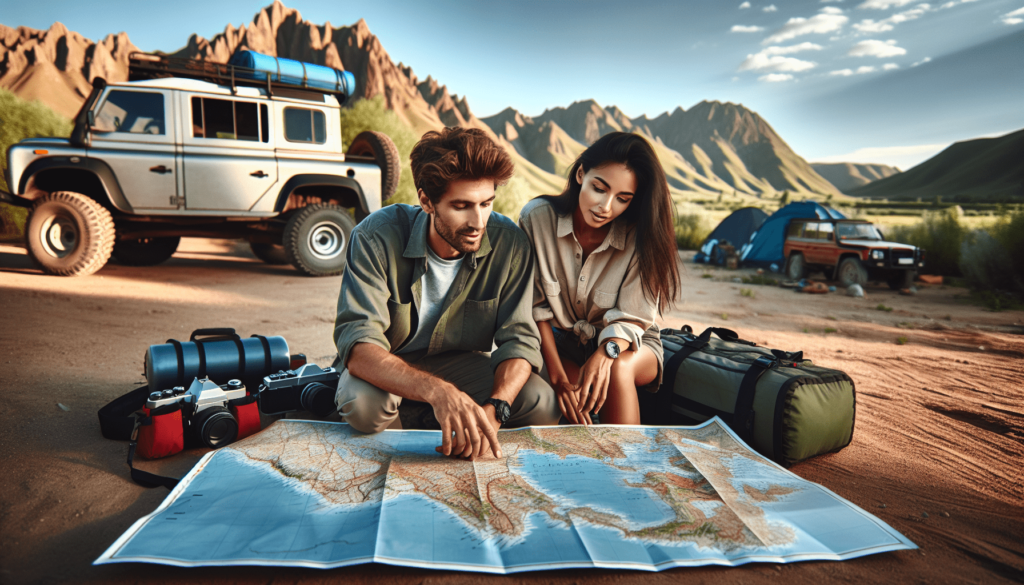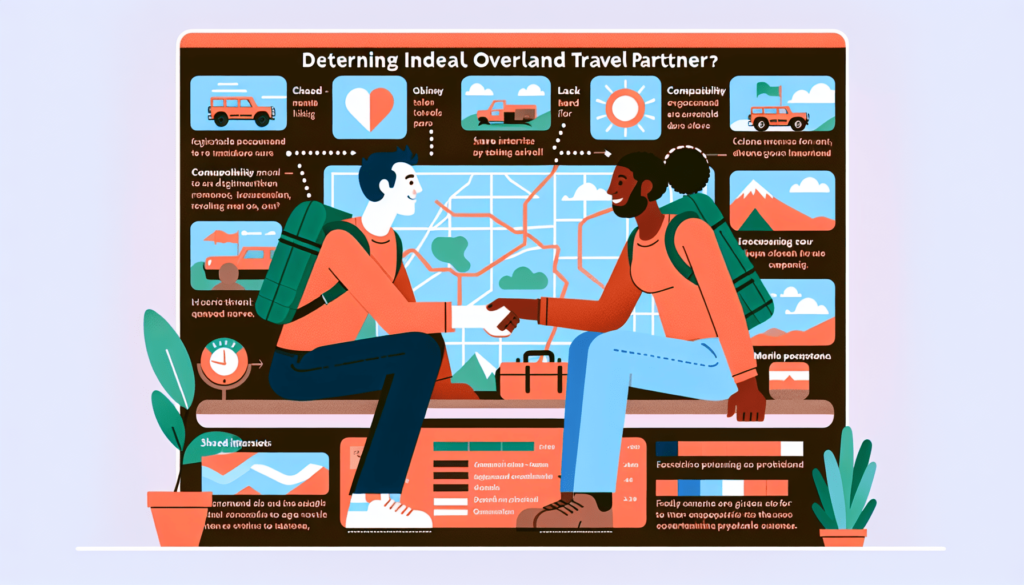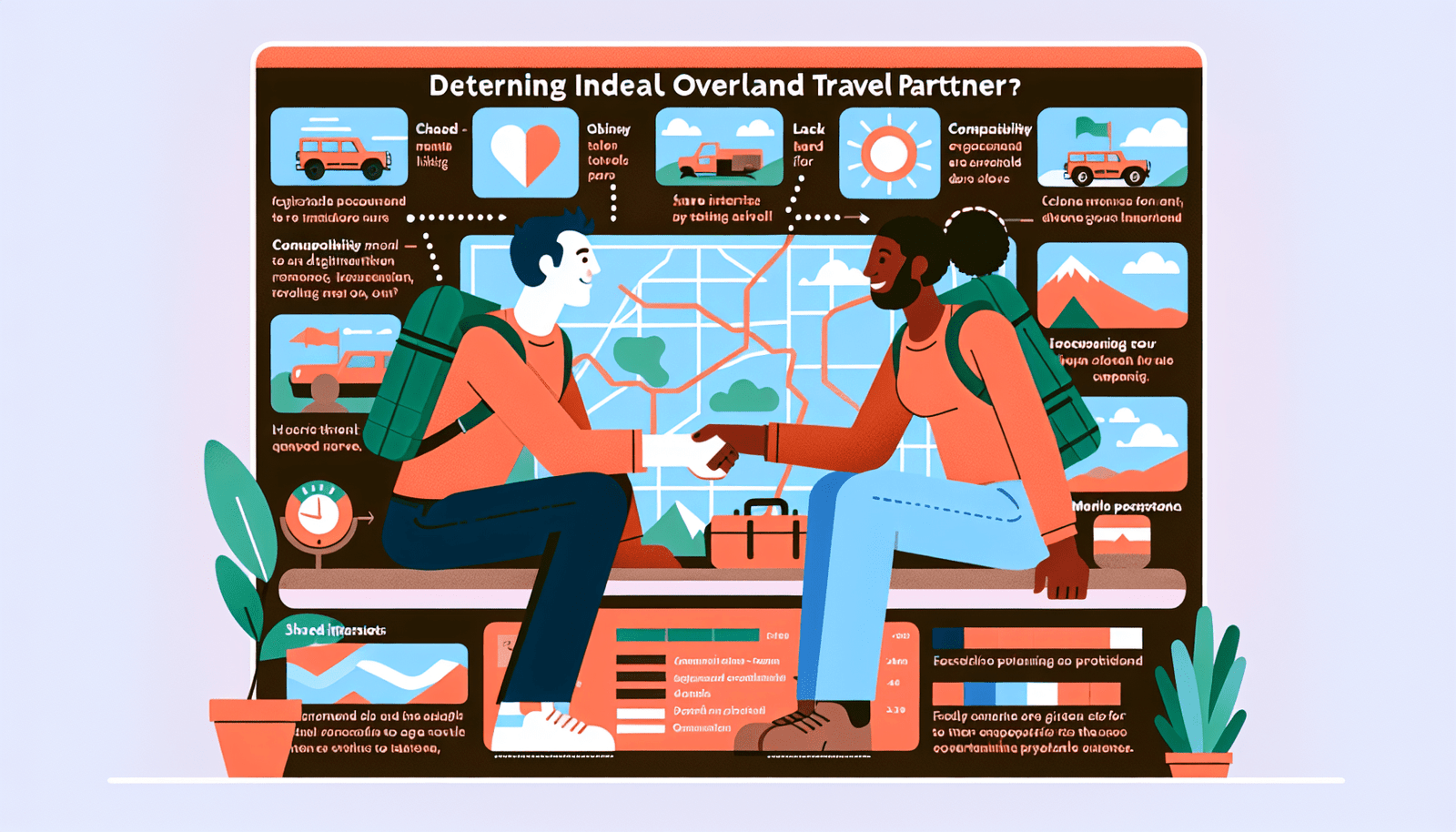If you’re embarking on an overland adventure, the first step is to find the right travel partner who can make your journey unforgettable. But how do you go about selecting the perfect companion to share in the excitement, challenges, and memorable moments that lie ahead? With a few key considerations, you can ensure your overland travel partner is someone who shares your sense of adventure, aligns with your travel style, and enhances the overall experience. From compatibility to shared interests, this article will guide you through the process of selecting the ideal overland travel partner who will make your journey truly remarkable.

1. Assess Your Travel Preferences
Evaluate your preferred travel style
When choosing a travel partner for an overland adventure, it’s important to consider your preferred travel style. Do you enjoy the comfort of luxury accommodations, or are you more inclined towards budget travel and camping? Determine whether you prefer to travel at a leisurely pace, taking time to soak in the surroundings, or if you like to be constantly on the go, exploring and experiencing as much as possible.
Consider the level of adventure you seek
Different people have varying levels of adventure they seek in their travels. Some may be adrenaline junkies, always looking for thrill-seeking activities, while others prefer a more laid-back and relaxed approach. Assess your own level of adventure and ensure that your potential travel partner aligns with your preferences. It can be disappointing if one person wants to skydive while the other prefers to relax on the beach.
Determine your comfort level with roughing it
Overland travel often involves staying in remote areas, camping, or spending nights in basic accommodations. Consider your own comfort level with roughing it and whether you are open to embracing the challenges that may come with it. Discuss this with your potential travel partner to ensure you are compatible in terms of accommodation preferences.
Decide on your flexibility and spontaneity
Flexibility and spontaneity are key elements of overland travel. Sometimes plans change at the last minute, roads get blocked, or unexpected opportunities arise. Think about how flexible and spontaneous you are willing to be during your trip and find a travel partner who shares the same mindset. It’s important to have a partner who can go with the flow and adapt to changing circumstances.
2. Define Your Travel Goals
Identify your main objectives for the trip
Before choosing a travel partner, it’s essential to identify your main objectives for the overland trip. Are you seeking a cultural immersion, wildlife exploration, or adventure? Understanding your own goals will help you find a partner who shares similar interests and priorities. It ensures that both of you can make the most out of the journey and have a fulfilling experience.
Clarify the purpose of your overland travel
Overland travel can serve different purposes for different people. Some may view it as a way to disconnect from the daily grind and find inner peace, while others may see it as an opportunity to challenge themselves and step out of their comfort zones. Clarify your own purpose for the trip and discuss it with your potential partner to ensure alignment and understanding.
Outline specific destinations or experiences you want to prioritize
If there are specific destinations or experiences you have in mind for your overland travel, make sure to outline them in advance. Discuss these priorities with your potential travel partner and see if they have similar interests or if they are open to exploring those places. Having mutual excitement and enthusiasm for the same destinations can enhance the overall experience for both of you.
Consider potential conflicts or compromises with a travel partner
While it’s great to share similar travel goals, it’s important to also anticipate potential conflicts or compromises that may arise during the trip. Discuss any concerns or differences in expectations with your potential travel partner. This will help you identify areas where you may need to find common ground or make compromises to ensure a harmonious journey.
3. Assess Compatibility
Evaluate communication and decision-making styles
Effective communication and decision-making are crucial for a successful travel partnership. Evaluate your potential travel partner’s communication style and how their decision-making process aligns with yours. It’s important to have open and transparent communication, as well as a willingness to compromise and make decisions together.
Consider similar interests and hobbies
While having different interests can bring diversity to a travel partnership, it’s also important to have some common ground. Consider the interests and hobbies of your potential travel partner and see if there are enough shared activities that can enhance your experience together. Having common interests can foster a stronger bond and make the journey more enjoyable.
Assess compatibility in terms of energy levels and physical abilities
Overland travel often requires physical stamina, whether it’s hiking, carrying luggage, or enduring long journeys. Assess your own energy levels and physical abilities, and make sure they align with your potential partner’s. It’s important to have compatible endurance levels to avoid any difficulties or imbalances during the trip.
Consider the dynamics of your relationship with potential travel partners
When choosing a travel partner, take into account the dynamics of your relationship with them. Are you close friends, acquaintances, or family? Consider how well you know the person and how you interact with them in different situations. It’s important to choose someone with whom you have a positive and compatible relationship to ensure a harmonious journey.
4. Discuss Budget and Financial Considerations
Determine individual budget constraints
Discussing budget constraints is essential before embarking on an overland trip with a travel partner. Consider your own financial limitations and communicate them openly. It’s important to find a partner who is comfortable with a similar budget or who is willing to make adjustments to accommodate both parties’ financial circumstances.
Discuss shared expenses and financial arrangements
Traveling with a partner often involves shared expenses, such as accommodations, transportation, and meals. It’s important to have a transparent discussion about how these expenses will be divided and managed. Explore different financial arrangements, such as splitting costs equally or taking turns covering expenses, and find a solution that works best for both of you.
Assess financial responsibility and transparency
Trust and transparency are crucial when it comes to financial matters. Assess your potential travel partner’s financial responsibility and determine if they are someone you feel comfortable entrusting with shared expenses. Ensuring that both parties are responsible and committed to managing finances fairly will help avoid any conflicts or misunderstandings during the trip.
Consider a potential travel partner’s spending habits
Consider the spending habits of your potential travel partner and ensure they align with your own financial priorities. If one person prefers to splurge on lavish meals and accommodations while the other prefers a more frugal approach, it can create tension. Discuss spending habits and find a balance that satisfies both parties’ preferences and financial capabilities.

5. Investigate Travel Experience
Assess previous travel experience and skills
When choosing a travel partner for an overland adventure, it’s important to assess their previous travel experiences and skills. Someone with extensive travel experience may bring valuable insights and knowledge to the trip. However, even if your potential travel partner is a novice traveler, their enthusiasm and willingness to learn can still make for a great partnership.
Consider compatibility in terms of travel knowledge and resources
Consider how compatible your potential travel partner’s travel knowledge and resources are with your own. If one person has extensively researched the destinations or has access to local connections, it can greatly enhance the journey. However, even if your knowledge is limited, having a partner who is resourceful and eager to learn can still lead to a fulfilling experience.
Evaluate problem-solving and adaptability skills
Overland travel often presents unexpected challenges or unforeseen circumstances. Evaluate your potential partner’s problem-solving skills and how well they adapt to changing situations. It’s important to have someone who can think on their feet and find creative solutions when things don’t go according to plan. This will ensure a smoother and more enjoyable journey.
Discuss previous overland travel experiences
Discussing previous overland travel experiences can provide valuable insights into how compatible you may be as travel partners. Ask about their previous journeys, the challenges they faced, and how they overcame them. This will give you a glimpse into their ability to handle the unique demands of overland travel and how well they may accommodate your own preferences and needs.
6. Gauge Commitment and Availability
Determine the level of commitment to the trip
Before choosing a travel partner, determine their level of commitment to the overland trip. Discuss their expectations, availability, and how much time they are willing to dedicate to the journey. It’s important to find someone who shares a similar level of enthusiasm and commitment to ensure that both of you are equally invested in the experience.
Assess availability and flexibility in terms of time
Overland travel often requires a significant amount of time. Assess your potential partner’s availability and flexibility to ensure they can commit to the duration of the trip. It’s important to align your schedules and make sure there are no conflicting commitments that may disrupt or shorten the journey.
Discuss potential conflicts or commitments that may affect the trip
Discuss any potential conflicts or commitments that may arise during the trip. This could include work-related obligations, family events, or personal commitments. Understanding these potential conflicts in advance will help you plan accordingly and find solutions that minimize any disruptions or compromises to the trip.
Consider long-term travel plans or aspirations
Consider your own long-term travel plans or aspirations and discuss them with your potential travel partner. If you have dreams of embarking on extended journeys or if you have a desire to explore specific regions in the future, it’s important to find someone who shares similar ambitions. This will ensure that your overland trip can be a stepping stone towards your long-term travel goals.
7. Prioritize Safety and Health
Ensure compatibility in terms of risk tolerance
Prioritizing safety is essential when choosing a travel partner for an overland adventure. Assess your potential partner’s risk tolerance and ensure it aligns with your own. It’s important to have someone who shares a similar attitude towards safety and is willing to take precautions to minimize potential risks during the trip.
Discuss health concerns, allergies, and special needs
It’s important to discuss any health concerns, allergies, or special needs with your potential travel partner. This will help you ensure that both of you can take the necessary precautions and accommodations to address any specific health or dietary requirements. Open communication about these concerns will contribute to a safer and more comfortable journey.
Assess knowledge of first aid or emergency preparedness
Assess your potential partner’s knowledge of first aid and emergency preparedness. Having basic first aid skills and being prepared for emergencies can make a significant difference in overcoming unforeseen situations during an overland trip. Consider taking a first aid course together to enhance your skills and ensure you are both prepared to handle any potential emergencies.
Determine compatibility in terms of safety precautions
Discuss your safety precautions and determine if they align with your potential travel partner’s mindset. Consider the use of safety equipment, such as GPS devices, communication tools, or travel insurance. It’s important to have similar attitudes towards safety to ensure a secure and worry-free journey.
8. Communicate Expectations
Discuss personal boundaries and privacy
When traveling with a partner, it’s important to discuss personal boundaries and privacy. Determine how much alone time each person needs and establish guidelines for respecting each other’s privacy. Having open communication about these expectations will help create a comfortable and respectful travel environment.
Clarify expectations regarding alone time and socializing
Determining how much alone time and socializing each person expects during the trip is crucial. Discuss your personal preferences and find a balance that works for both of you. This will ensure that both of you have the opportunity to recharge and enjoy the company of others without feeling overwhelmed or neglected.
Address potential conflicts or challenges that may arise
Overland travel can present unique challenges and conflicts. It’s important to address potential conflicts or challenges that may arise during the trip and discuss how you can work through them together. Having open and honest conversations about these possibilities will help you establish a strong foundation for problem-solving and conflict resolution.
Establish open and honest communication
Establishing open and honest communication is vital when choosing a travel partner. Encourage each other to communicate openly about any concerns, desires, or needs that may arise during the journey. This will help you navigate through any challenges and foster a strong and supportive partnership.
9. Test Compatibility During a Trial Trip
Plan a shorter trip together as a trial
To assess compatibility with your potential travel partner, plan a shorter trip together as a trial. This will give you a taste of what it’s like to travel together and allow you to observe each other’s behavior and attitudes in a real travel setting. Use this opportunity to see how well you can navigate through different situations and ensure compatibility before committing to a longer journey.
Assess compatibility in a real travel setting
During the trial trip, pay attention to how compatible you are in a real travel setting. Observe how well you communicate, make decisions together, and handle any challenges that may arise. This will provide valuable insights into how well you can work as a team and support each other during the actual overland trip.
Observe how each other reacts to different situations
Use the trial trip to observe how your potential travel partner reacts to different situations. Pay attention to their adaptability, problem-solving skills, and overall attitude. This will help you gauge how compatible you are in handling the unpredictability and demands of overland travel.
Evaluate overall compatibility and enjoyment
After the trial trip, take the time to evaluate the overall compatibility and enjoyment of traveling together. Reflect on the experiences you shared, how well you communicated and collaborated, and if you felt comfortable and supported throughout the journey. It’s important to have a sense of mutual satisfaction and enjoyment to proceed with confidence to an overland adventure.
10. Trust Your Instincts
Listen to your gut feelings and intuition
Trust your gut feelings and intuition when choosing a travel partner. If something doesn’t feel right or you have reservations, it’s important to listen to those instincts. Your intuition can often guide you towards the right decision.
Take potential red flags seriously
Be vigilant for any potential red flags during the selection process. If someone displays behavior or attitudes that raise concerns, it’s important to take them seriously and evaluate whether they may affect the dynamics of your travel partnership. Address any red flags openly and honestly before making a final decision.
Consider previous experiences or warnings
Consider any previous experiences or warnings that may be relevant to your decision-making process. If you have heard negative feedback or had previous encounters that raise doubts, it’s important to take them into account. Learning from past experiences can help you make a more informed choice.
Trust yourself to make the right decision
Ultimately, trust yourself to make the right decision when choosing a travel partner. You know yourself best and what you need in a travel companion. By considering all the factors outlined in this article and trusting your instincts, you will be able to make a choice that leads to a successful and enjoyable overland journey.

